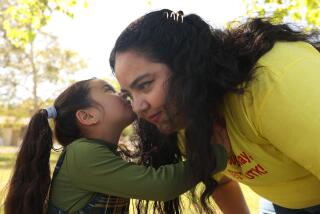What Parents Should Know About IQ Tests
- Share via
An entire debate can be launched just on the question of what intelligence is, whether it can really be measured, and how.
Let’s skip it.
Suffice it to say that educators now recognize that intelligence exists in many forms (besides “book knowledge”) that are equally valuable and usable.
But if you want your child admitted to a program for gifted students in a California public school, he or she still may have to take an IQ test to qualify--most likely the Wechsler Intelligence Scale for Children, commonly referred to as the WISC.
The WISC and other intelligence tests were once more widely used in California schools, but recently the courts found that IQ tests discriminate against students who are not white or middle-class. As a result, the WISC and other IQ tests are now generally used only for special program placement and only at the request of the student, parent, teacher or administrator.
The most recent version of the test--called the WISC 3--has been commended for its reduction in cultural bias. It takes about an hour and a half to complete.
The WISC 3 has two parts, verbal and performance, and has a total of 12 subtests.
Subtests for the verbal portion include vocabulary, math, analogies, concept formation, and judgment (common sense).
In the performance section, subtests include visual-motor integration, mazes, puzzles and part-whole relationships.
The WISC is usually combined with a clinical interview and a battery of personality tests; it is not meant to be used as a sole measure of intelligence.
By examining a student’s performance on the WISC, teachers, parents and psychologists can pinpoint a child’s aptitudes, as well as any neurological problems or learning disabilities.
Scores are calculated for each subtest, then combined to figure an overall IQ.
The score scale for the WISC is roughly similar to other intelligence tests, such as the Stanford-Binet or Woodcock-Johnson.
A few words of caution before you read the scale breakdown: The score does not matter as much as the range. In other words, there’s no noticeable difference between the abilities of kids with IQs of 120 and 125. They are both in the “superior” range. A jump from 120 to 130, however, may be significant.
The general IQ breakdown labels a score of 69 and under as mentally deficient; 70 to 79 as borderline average; 80 to 89 as low average; 90 to 109 as average; 110 to 119 as high average; 120 to 129 as superior, and 130 and more as very superior. (The Stanford-Binet test adds another category at the 145 mark.)
To gain some perspective, consider that about 50% of the general population scores in the 90-to-109 range, while only about 2% score 130 or above.
There’s no strict “minimum” IQ for admission to gifted programs, since educators and psychologists try to look at a variety of personality and achievement factors to evaluate a student.
But more often than not, students in gifted programs tend to score in the 130 range, while those in highly gifted programs score about 145 and above.
As far as improving or raising an IQ score, don’t count too heavily on it. The WISC and other IQ tests are designed to measure innate ability as much as possible, rather than learned information. So people generally score about the same throughout their lives.
Even so, those who pay attention to the instructions, relax, feel motivated to do well, and are completely familiar with the rather formal language used in the test will have the best predisposition for the test. (And, frankly, I suspect that middle-class whites will still have at least a slight advantage, despite efforts to eliminate cultural biases.)
If you’re interested in enrolling your child in certain school programs, then he or she can take the test free, upon your request. Otherwise, you’ll have to hire a psychologist.
In either case, consider some tips, both before and after the test.
First, make sure that the test is given by a psychologist who has lengthy training and experience in administering and interpreting the test. In general, only a Ph.D. can administer the WISC.
Make sure your child is as relaxed as possible for the test. Scolding her for something on the way to the test may cause anxiety and make it difficult for her to concentrate.
Tell the child to ask the test-taker for more explanation if the instructions seem unclear at any point.
And, since most of the test is timed, remind the child to work carefully, but quickly.
After the test, demand a thorough consultation about the results; you need to know more than just the raw score.
Ask for an explanation of each subtest and its separate score. If there are drastic discrepancies between scores on subtests, check that out. It could indicate a learning disability, or maybe just an error in testing.
Ask what percentile your child’s score falls into; it tells you how the child compares to other test-takers the same age.
Finally, ask the psychologist for some advice before telling your child his IQ score. Kids react differently to such news, so some may be discouraged or hurt, while others may be boosted and motivated.
It all depends on the child’s age, disposition, and test performance, and a psychologist can help you assess the value of telling the child his IQ.
More to Read
Sign up for Essential California
The most important California stories and recommendations in your inbox every morning.
You may occasionally receive promotional content from the Los Angeles Times.












